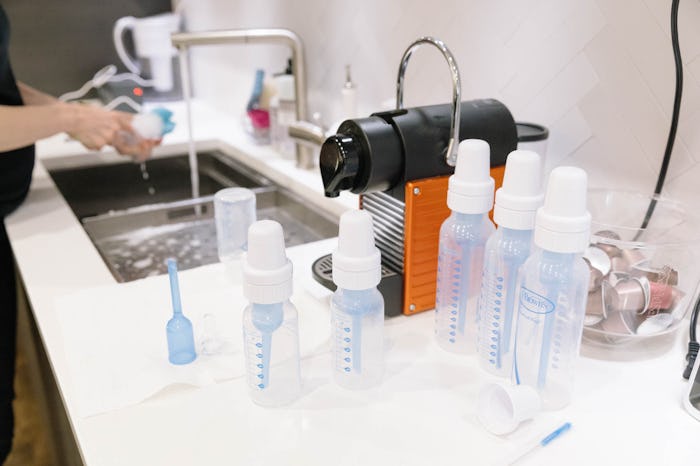Life
Here's How To Save Yourself Some Time When It Comes To Cleaning Your Baby's Bottles
We all know parenting is no easy gig. It may seem the actual act of raising a human is the hardest part of it, but day to day, it's the littlest things that really trip us up. How often should I bathe my baby? How long should their naps be? What exactly should I feed them? And, when they're infants, it gets even trickier with tummy time and breast milk. You'll even start wondering if all the extra work you're doing is necessary. Like do you have to sanitize bottles after every use? Nobody wants to do extra dishes, so that last question is a really important one. It can be confusing, too, because some manuals and experts use "sanitize" and "sterilize" interchangeably, but there's actually a big difference.
And fortunately, there's more good news. The process of sterilizing bottles (removing all microbial growth, typically by heating or boiling) dates back to when safe water supplies were not standard in this country and is a largely antiquated practice now. Most health care providers are not very concerned about sterilizing bottles, unless you use well water or your city is known to have a contaminated water supply, according to the American Academy of Pediatrics (AAP). Sanitizing, however, removes most microbial growth (bacteria, germs) from your bottles and should be done daily. You can sanitize your bottles by hand (in hot, soapy water) or on the top rack of your dishwasher using a hot water cycle and detergent.
Keeping your baby's bottles clean can be simpler than you might think. As Parenting suggested, washing your baby's bottles in the dishwasher is likely as easy and effective as it gets. Wash bottles after each use, and be sure to separate each piece before loading them into the washer. Rinsing out formula or breast milk in the sink is always a good idea — sometimes, depending on your dishwasher, residue may become stuck onto the bottles or nipples if not rinsed beforehand. The added bonus of using the dishwasher is that most machines also have a sanitize cycle which you can use occasionally to make sure everything is as clean as can be.
If you're washing bottles by hand, the Centers for Disease Control and Prevention (CDC) recommends a simple plan as a good method. First, wash your hands thoroughly with soap and water to ensure your hands are germ-free. Then rinse out leftover milk and residue from bottles (resist placing them in the sink, as this could contaminate them). Put everything in a big basin or container (I used a large mixing bowl) that you'll use specifically to clean your baby feeding items.
Fill the basin with hot water and soap, and let all the bottles and parts soak while you scrub each one with a designated bottle brush or scrubber. Be sure to squeeze water through the nipple holes to make sure there's no milk residue clogging it up. Rinse each item under running water, and set out to air dry on a clean dish towel or drying rack.
Make sure everything is completely dry before storing — bacteria can grow in the small amount of water left at the bottoms of bottles or on other bottle parts. Be sure to wash and clean both your basin and the drying rack every few day as well (the dishwasher's sanitize cycle is great for this).
Testing out your dishwasher will probably be integral to what method you choose for washing your baby's bottles. I found our dishwasher to leave soap residue or water stains on my little guys' bottles, and I ended up washing them by hand again anyway. Soon after, I gave up on the dishwasher for washing bottles daily. Instead, I'd save my bottle-washing work for the evenings, when the babies were in bed. I'd prop up Netflix on my iPad on the counter, and binge watch something while hand-washing bottles. It didn't seem like work, and I was sure the bottles were as clean as could be. Win, win.
Check out Romper's new video series, Bearing The Motherload, where disagreeing parents from different sides of an issue sit down with a mediator and talk about how to support (and not judge) each other’s parenting perspectives. New episodes air Mondays on Facebook.
